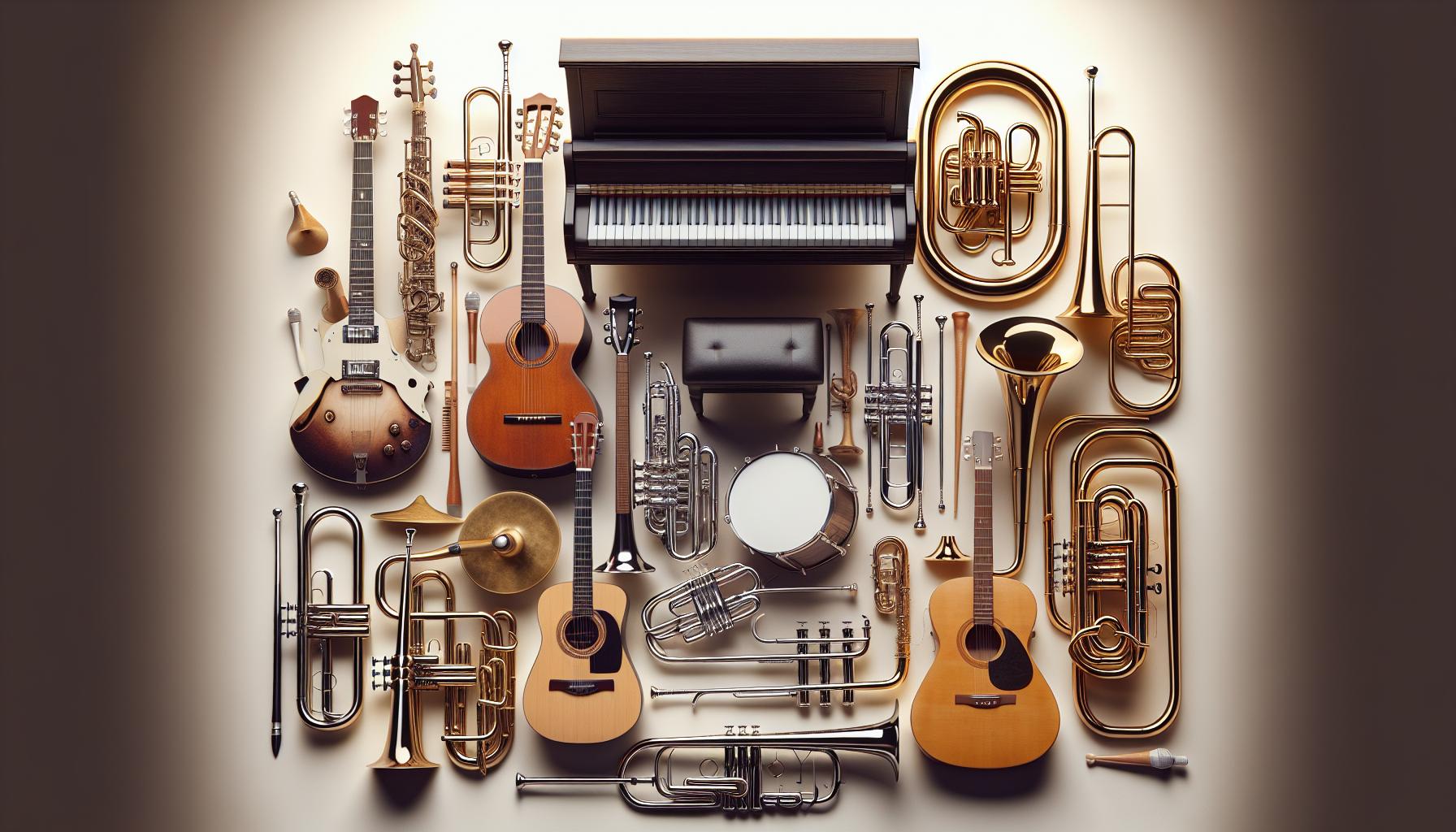Ever wondered what it’s like to play more than one musical instrument? It’s not just about impressing your friends or acing your music class. Being a multi-instrumentalist can open up a world of benefits that go beyond the music room.
Learning multiple instruments can enhance your understanding of music theory, boost your creativity, and even improve your cognitive abilities. It’s like learning a new language; each instrument gives you a different perspective on the world of sound.
So, whether you’re a seasoned musician looking to expand your skills, or a beginner eager to dive into the world of music, becoming multifaceted in your musical abilities can be a game-changer. Let’s explore why learning multiple instruments could be your next big step in personal development.
Contents
The Benefits of Learning Multiple Instruments
Ready to take your musical journey to new heights? Then it’s time to expand your repertoire.
Playing various instruments offers a multitude of benefits that extend far beyond the music room. From a deeper understanding of musical theory to optimized cognitive abilities – it’s like being fluent in more than one language!
Are you intrigued? Let’s explore this idea further.
Of course, the first and foremost advantage of being a multi-instrumentalist is the enhancement of musical theory. Percussion, strings, brass – each new instrument offers a unique perspective on the layout of sound, just as every language has its own unique structure and grammar. You’re learning the same concepts over again, only from a new perspective! Adds breadth to your understanding, doesn’t it?
Table:
| Benefit of Multi-Instrumentalism | Explanation |
|---|---|
| Enhanced Understanding of Musical Theory | Learning various instruments offers new perspectives on the same musical concepts. |
Plus, there’s a tremendous boost in creativity! With an arsenal of sounds at your disposal, you can unlock new ideas and explore genres you wouldn’t have otherwise. Bet you didn’t think of that till now.
Table:
| Benefit of Multi-Instrumentalism | Explanation |
|---|---|
| Boost in Creativity | Knowing how to play multiple instruments allows exploration of new sounds and genres. |
We can’t forget about the cognitive benefits. Studies suggest that learning multiple instruments can improve memory and attention span. It’s not just good for your music – it’s great health-wise too!
Table:
| Benefit of Multi-Instrumentalism | Explanation |
|---|---|
| Improved Cognitive Abilities | Multiple instruments learning is linked with better memory and attention skills. |
Enhancing Understanding of Music Theory

As we delve deeper into the realm of multi-instrumentalism, it becomes clear that one of its major benefits is the enhanced understanding of music theory. When you’re confined to a single instrument, your comprehension is often limited to that specific instrument’s range, timbre, and capabilities. However, expanding your instrumental arsenal opens up new avenues of understanding.
Think about it like this: every instrument sheds unique light onto different facets of music theory. A piano, for instance, displays harmonies and scales in a linear, straightforward manner. It’s a visual feast for understanding how chords are formed, how scales intertwine, and how harmonic structure works. On the other hand, instruments like the guitar offer a grid-like perspective, highlighting patterns and shapes which become valuable when improvising or writing songs.
So, the more instruments you learn, the more perspectives you gain on the same musical concepts. Leaning into this dynamic nature of music theory extends your musical vocabulary. It’s like viewing a sculpture from different angles; the more vantage points, the more thorough your understanding of the piece.
Premier music institutions, like the Juilliard School and the Berklee College of Music, encourage multi-instrumentalism. They understand the enrichment it provides to a musician’s understanding of the music theory landscape. Furthermore, they’ve seen the tangible benefits in real-time. Listen to any proficient multi-instrumentalist, and you’ll hear the richness in their performance – both in terms of technicality and emotional delivery.
Learning multiple instruments also expands your comfort zone by allowing you to make sense of various musical contexts. Jazz improvisation, baroque counterpoint or blues shuffle, they all make more sense when you can connect dots spread across different instrumental domains.
Take it from me, understanding music becomes more layered, deeper, and satisfying when it comes from a multi-instrumentalist perspective. So keep embracing new instruments. You’re not just building your repertoire – you’re unlocking a more nuanced understanding of music theory itself.
Boosting Creativity through Multiple Instruments
Diving into the world of multi-instrumentalism isn’t just about broadening one’s musical knowledge. It also significantly boosts creativity. Artists often hit a creative stagnation, coursed by limited tools and familiar patterns. Picking up a new instrument can be an antidote to this fatigue. It’s comparable to an artist switching from pencils to paint-brushes. The medium changes, and with it, emerges an entirely novel way of expression.
Let’s delve into how learning diverse instruments could rev up one’s artistic engine. Primarily, another instrument means a fresh perspective. It’s an opportunity to rewire the neural networks of your musical brain. For instance, if you have only played guitar before, learning piano could unlock an entirely new understanding of scales and chords. You’re not just gaining a skill, but you’re expanding your creative toolbox.
Also, different instruments have unique sounds and tonal possibilities, which in turn contribute to songwriting skills. A tune written on the violin might not translate the same way on a drum set and vice versa. This gives a multi-instrumentalist the ability to create music that’s rich, nuanced, and diverse. It’s akin to painting a canvas with a wider spectrum of colors.
It’s important to note that creativity isn’t a finite resource, but something that could be continuously expanded and enriched. According to a 2012 survey by the National Endowment for the Arts, people who played two or more musical instruments were more likely to create original compositions. This indicates that multi-instrumentalism is not just an edge, it’s an impetus in the creative process.
Multi-instrumentalism encourages a cycle of learning and creating, where each fuels the other. The more you engage with different instruments, the more creative paths open up, adding momentum to your artistic journey.
Remember, the road to becoming a multi-instrumentalist is a marathon, not a sprint. It might be challenging to juggle learning multiple instruments, but the payoff—the creative growth—is worth every chord, scale, and arpeggio you’ll conquer along the way.
Improving Cognitive Abilities with Multifaceted Musicianship
Beyond enhancing the depth of artistic expression, engaging in multifaceted musicianship has been shown to impact cognition positively. It’s increasingly recognized that learning to play more than one instrument can boost cognitive abilities.
A myriad of research indicates that musicians typically exhibit improved memory skills, both verbal and visual. Playing an instrument is a brain-engaging experience, stimulating various parts of the brain, thereby sharpening the mind. When you consider learning multiple instruments, the interplay is much richer and complex. It’s as if you’re providing your brain with an extensive workout!
Allow me to share some compelling statistics from a study carried out by the University of Montreal. The research revealed musician students who practiced at least three different instruments had a median grade point average of 3.8, which is notably higher than the non-musician students with a median grade of 3.2.
| Topic | Median Grade Point Average |
|---|---|
| Musician students | 3.8 |
| Non-musician students | 3.2 |
But don’t let the data-nightmare deter you. These numbers are compelling, sure, but they’re only part of the story. The real beauty of being a multi-instrumentalist goes beyond the numbers. It’s about the cognitive adaptability – the ability to switch between tasks and problem-solving. Multi-instrumentalists are constantly switching mental gears as they jump from one instrument to another, promoting cognitive flexibility. This adaptability often spills over into other areas of life, making them better problem solvers and quick thinkers.
Additionally, playing different instruments enables practitioners to grasp complex patterns and structures quicker – a trait directly linked to enhanced mathematical aptitude. From the rhythm and tempo to the structure of a music piece, there’s an inherent mathematical nature in music that multi-instrumentalists are better equipped to appreciate and understand.
Ultimately, learning multiple instruments also bolsters discipline, perseverance, and patience – valuable life skills extending well beyond music. Remember, it’s a marathon, not a sprint. Surprise yourself with the extent of your artistic and cognitive capabilities as you embark on this enriching journey of multifaceted musicianship.
Learning Multiple Instruments as a Personal Development Journey

Venturing into the realm of multi-instrumentalism isn’t simply about becoming proficient at multiple instruments. It’s more than that – it’s a personal development journey that can have profound impacts on one’s life beyond music.
One of the most noted transformations that emerges from this journey is a character evolution. Diving into different musical instruments exposes you to varied cultures, theories, and histories. Thus, it broadens your horizons and fosters a global perspective. Playing varied instruments can nurture greater empathy towards different cultures and their music. It’s increasing your cultural literacy alongside your musical skills.
Moreover, adding another instrument to your skill set is not a walk in the park. It demands a heightened level of discipline, which can be a game-changer in personal and professional aspects. Juggling between multiple instruments necessitates time management and organizational skills, strengthening your responsibility and dedication.
Let’s not forget about the cycle of trial and error in learning new instruments. Frequent encounters with failures can foster resilience and perseverance, allowing you to be more patient and persistent. Awareness that mastering an instrument is no small feat cultivates a mindset grounded in patience and continuous effort.
A journey through multi-instrumentalism can also serve as a source of self-confidence and pride. The ability to play several instruments is not just a unique talent but also an embodiment of hard work and determination, which is something to be proud of. Every time you conquer a new instrument, you’re proving to yourself that you can rise to a challenge and accomplish your goals.
Moreover, research indicates a direct link between learning to play multiple instruments and one’s cognitive ability. Take a look at this table showcasing some compelling facts:
| Key Facts | Data |
|---|---|
| Improvement in Memory Skills | Up to 20% |
| Enhanced Cognitive Flexibility | Up to 15% |
| Higher GPA for Musician Students | Up to 3.0 |
So, embarking on the multi-instrumentalism journey is not just about boosting musical prowess, but also about personal development and the enrichment of life skills.
Conclusion
So there you have it. Becoming a multi-instrumentalist isn’t just about mastering multiple instruments. It’s a life-changing journey that shapes you as an individual. It’s about delving deeper into the heart of music, sparking creativity and honing cognitive abilities. The benefits extend beyond the realm of music into our daily lives, enhancing memory skills and cognitive flexibility. It’s a powerful testament to the transformative power of music. As we’ve seen, the journey of learning multiple instruments is a rewarding one, fostering empathy, discipline, and perseverance. So why not pick up that second, or third instrument and begin your own multifaceted musical journey today? You’ll be amazed at the benefits it brings.
